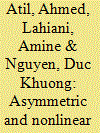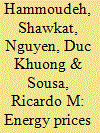| Srl | Item |
| 1 |
ID:
127283


|
|
|
|
|
| Publication |
2014.
|
| Summary/Abstract |
In this article, we use the recently developed nonlinear autoregressive distributed lags (NARDL) model to examine the pass-through of crude oil prices into gasoline and natural gas prices. Our approach allows us to simultaneously test the short- and long-run nonlinearities through positive and negative partial sum decompositions of the predetermined explanatory variables. It also offers the possibility to quantify the respective responses of gasoline and natural gas prices to positive and negative oil price shocks from the asymmetric dynamic multipliers. The obtained results indicate that oil prices affect gasoline prices and natural gas prices in an asymmetric and nonlinear manner, but the price transmission mechanism is not the same. Important policy implications can be learned from the empirical findings.
|
|
|
|
|
|
|
|
|
|
|
|
|
|
|
|
| 2 |
ID:
132771


|
|
|
|
|
| Publication |
2014.
|
| Summary/Abstract |
We use a quantile regression framework to investigate the impact of changes in crude oil prices, natural gas prices, coal prices, and electricity prices on the distribution of the CO2 emission allowance prices in the United States. We find that: (i) an increase in the crude oil price generates a substantial drop in the carbon prices when the latter is very high; (ii) changes in the natural gas prices have a negative effect on the carbon prices when they are very low but have a positive effect when they are quite high; (iii) the impact of the changes in the electricity prices on the carbon prices can be positive in the right tail of the distribution; and (iv) the coal prices exert a negative effect on the carbon prices.
|
|
|
|
|
|
|
|
|
|
|
|
|
|
|
|
| 3 |
ID:
176784


|
|
|
| 4 |
ID:
097433


|
|
|
|
|
| Publication |
2010.
|
| Summary/Abstract |
This article extends the understanding of oil-stock market relationships over the last turbulent decade. Unlike previous empirical investigations, which have largely focused on broad-based market indices (national and/or regional indices), we examine short-term linkages in the aggregate as well as sector by sector levels in Europe using different econometric techniques. Our main findings suggest that the reactions of stock returns to oil price changes differ greatly depending on the activity sector. In the out-of-sample analysis we show that introducing oil asset into a diversified portfolio of stocks allows to significantly improve its risk-return characteristics.
|
|
|
|
|
|
|
|
|
|
|
|
|
|
|
|
| 5 |
ID:
097335


|
|
|
|
|
| Publication |
2010.
|
| Summary/Abstract |
This paper uses a time-varying parameter model with generalized autoregressive conditional heteroscedasticity effects to examine the dynamic behavior of crude-oil prices for the period February 7, 1997-January 8, 2010. Using data from four countries of the Gulf Cooperation Council, we find evidence of short-term predictability in oil-price changes over time, except for several short sub-periods. However, the hypothesis of convergence towards weak-form informational efficiency is rejected for all markets. In addition, we explore the possibility of structural breaks in the time-paths of the estimated predictability indices and detect only one breakpoint, for the oil markets in Qatar and the United Arab Emirates. Our empirical results therefore call for new empirical research to further gauge the predictability characteristics and the determinants of oil-price changes.
|
|
|
|
|
|
|
|
|
|
|
|
|
|
|
|